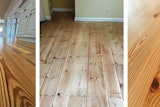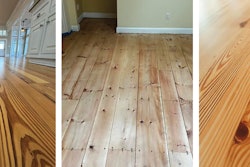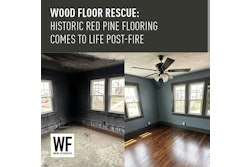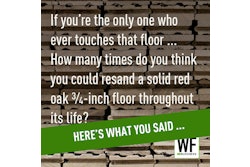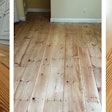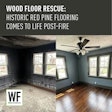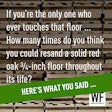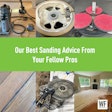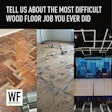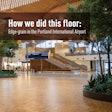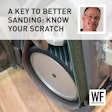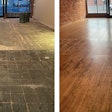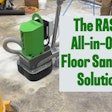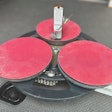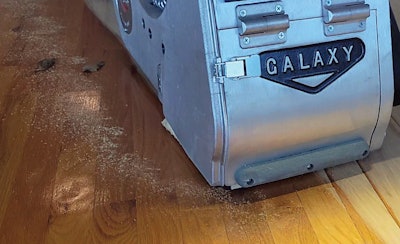
Three years ago we were parked on the street doing a beach house one block off the ocean and a guy pulled up on his bike between our box van and the house and said, “Where’s the owner of this company?” From his tone, I was wondering what he was about to complain about, but I stuck my head out anyway and told him I was one of the owners. He said he needed us to come down to his house to give him a price for doing his floors. It turns out he had hired another company, and they told him he should stop into one of their job sites to see their work. When he did, the job site was a mess, there was a worker standing smoking outside where the smoke was going right into the house, and when he looked in the van, it was a giant heap of tools—like they had just been thrown into the van. He told us, “If they don’t care about their tools, they won’t care about my house.” We put him on the schedule as soon as we had an opening—six months later.
It doesn’t cost anything
I’m telling that story to demonstrate a point: One thing that can set you apart from the competition has nothing to do with fancy equipment or using the best abrasives or the most expensive finish. It’s simple: Be clean. He stopped and asked for us because he saw how our van looked. Keeping your vehicle or trailer clean is something anyone can do—whether you are just starting out or you’ve been in business for decades—because it doesn’t cost any extra money.
The origins of our clean obsession
Our obsession with being clean comes from both me and my business partner and best friend, Jamie Lambert. When Jamie was young, he worked at a buffet restaurant, and the owner always told the staff: If you went to a restaurant and saw the kitchen and it was a mess, you wouldn’t go back. And if you saw the buffet and it was a mess, you wouldn’t want to eat. But if that same buffet looks clean, the same food will be appealing.
For my part, I worked in my dad’s millwork shop, which had a professionally designed dust containment system, so that was my expectation of how wood sanding was supposed to be. But when we started our company in 1992, when somebody would sand and finish a house, you couldn’t tell the color of the walls—if you were sanding oak, you had oak-colored walls. If the people sanding came out of the house, unless you knew the way they walked and talked and knew their mannerisms, you couldn’t tell who they were because they were covered in dust.
We did not know a single thing about wood flooring when we got our first sand job, which was 6,600 square feet of heart pine! We were scrambling to try to figure out how to clean the job. We ended up using big fans and literally had a yard blower trying to clean up the dust—it looked like the house was on fire from all the dust! On our next job, we were retrofitted a vacuum hose onto the buffer housing (we didn’t have a hole saw, so we drilled holes in a circle and punched out the metal for the end of the hose). Eventually we modified a trailer-mounted dust containment system designed by Dan Gill.
It’s essential for our health
Our obsession with controlling dust has many reasons. First, and most importantly, we’ve been at this job now for 30 years. I don’t want to have some sort of lung disease when I retire and not be able to play with my grandkids because I’ve been breathing some ridiculous amount of wood dust my whole life, and I don’t want that for our employees, either. There’s no end to how much cleaner and safer you can make your job sites for your employees, your clients and yourself.
Cleanliness: essential for sanding
If we’re rolling a machine around on a floor that’s not spotless, that machine is rolling across dust particles that make the sander move to a certain extent. That motion transfers to the head and makes marks in the floor, especially if you get extra sawdust stuck on the wheels. People will say, “Clean those wheels—it will fix those big waves.” You should have had them spotless before you ever got started and kept them spotless!
When the floor is always spotless from the sanding pass before, your eye is always inspecting. When you’re looking at a clean floor, the odds of missing something go down more and more, and the odds of you picking up some ghost grit on the floor that’s going to leave some crazy mark in the floor also go way down.
 Here I was demonstrating for a friend why you run the big machine left to right: You want the wheels running on your freshly sanded floor to decrease bounce. I put strips of hot glue on the floor to exaggerate the imperfections and ran right to left. You can see (photo at left) the lines created from sanding on the first pass and (at right) how they multiply on the next pass.
Here I was demonstrating for a friend why you run the big machine left to right: You want the wheels running on your freshly sanded floor to decrease bounce. I put strips of hot glue on the floor to exaggerate the imperfections and ran right to left. You can see (photo at left) the lines created from sanding on the first pass and (at right) how they multiply on the next pass.
Keep machines clean, the job tidy
At the end of the day, take the time to clean your machines. Sometimes people post pictures of them sanding, and their equipment looks like it just rolled down the highway. We have a compressor in each of our box vans with a big inverter so that all tools and machines are blown off and cleaned at the end of each day, and that keeps the vans cleaner, too. Long-term, it keeps your sanders running better with fewer maintenance problems.
Sometimes at the end of the day people leave the job site looking like they ran out because the place was on fire! Clean up before you go: Put the machines in the corner, and unplug and wrap up the cords. This also makes the job site safer.
It shows you care
When you don’t have dust in the house and you have a clean appearance, and you have clean cords, clean hoses and clean machines, people can see how much you care. If you come into their house with beat up equipment, will you care about their house? That goes for little things, too, like setting a sanding belt on the tile in their foyer instead of being careful to take care of their home. Care about it like that’s what pays your bills—because over time, it does.
We’re putting on a show
We’ve got a saying at our company: We aren’t just doing wood flooring, we’re putting on a show. That doesn’t mean a fake window dressing kind of show, it means that start to finish we’re going to show the customer that we want to be the best. At every step of the job, they’re going to see the effort we put into their floor. Recently a friend of mine in the industry caused a stir when he posted in a Facebook group that hardly anyone is doing anything new in the industry, but my comment was that no matter what you’re doing, you can always take that to another level. And being clean on your jobs—from your equipment to your sanding to your own appearance—is something that can take your company to another level.











